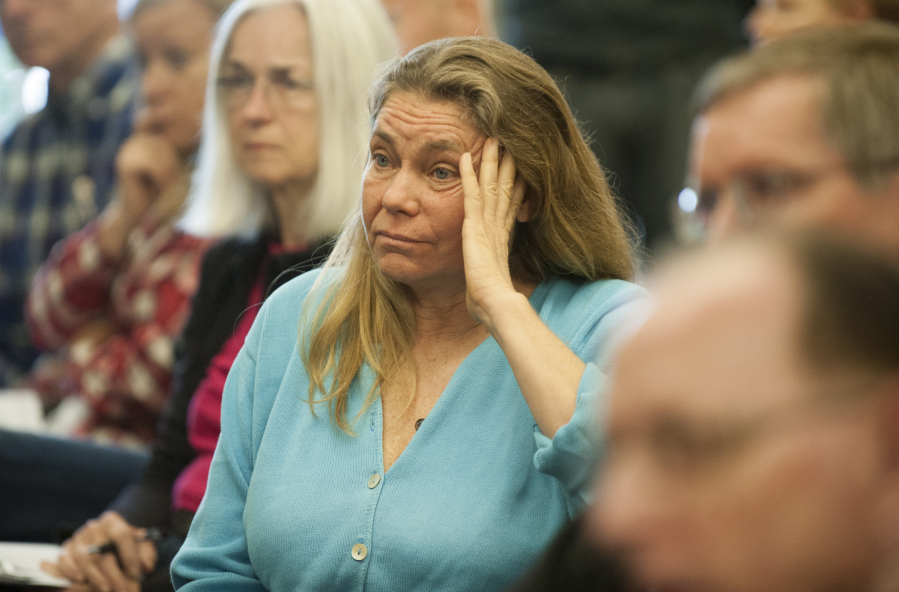City and fire officials from Mosier, Ore., drove more than an hour Tuesday to send a clear message to Port of Vancouver commissioners: The oil train derailment and fire that happened in their town could happen anywhere along tracks carrying crude.
“Right now we feel it’s Russian roulette,” said Arlene Burns, mayor of Mosier. “It’s not just our community that we’re standing up for, it’s all the communities along the tracks in Oregon and in Washington.”
Burns was among almost two dozen people who spoke against oil-by-rail transport during the open forum portion of the Port of Vancouver Board of Commissioners meeting Tuesday morning. Later in the hearing, Commissioner Eric LaBrant, an oil terminal opponent who had faced criticism for not taking action against the terminal, moved to cancel the port’s lease with Vancouver Energy. The motion died after it wasn’t seconded by either of the commission’s other two members.
On June 3, a train of 96 cars carrying crude oil derailed within Mosier city limits, leading to an evacuation of the tiny town after four cars caught fire and darkened the Columbia River Gorge skies with black clouds of oil smoke.
And Mosier, the city’s mayor said, dodged a bullet.
“What if it had been windy like it was the day before, the day after? What if it had been August, when everything is a tinderbox ready for a flame? What if it had been 2 miles down the tracks and all of that crude would have gone into the Columbia River, into salmon habitat?” Burns asked.
Officials have said 42,000 gallons of crude oil were released, about 10,000 gallons of which was recovered in wastewater systems. The rest was burned off, captured by booms or absorbed into soil.
Jim Appleton, Mosier fire chief, was the incident commander during the derailment that he said was still an active disaster.
“As their fire prevention officer, how can I prevent a next time?” he asked. “That volume of hazard has no business in our communities and potentially exposed to our irreplaceable mother Columbia.”
Appleton said that even though Union Pacific has had a great safety record, there was still a derailment.
“My professional opinion is they cannot be made safe enough to justify the prolific profit they generate somewhere,” he said. “This is about the cargo and the mode being unsafe. There will be a next time if fossil fuel unit trains continue to run.”
Tesoro Corp. and Savage Cos., operating jointly as Vancouver Energy, want to build a 360,000-barrel-per-day rail-to-marine terminal that would send continental crude to West Coast refineries. The crude would be delivered by four mile-and-a-half-long unit trains, each pulling more than 100 tank cars with carrying capacities of 23,500 to 34,500 gallons. The terminal would mean an average of four more oil trains per day than currently roll through Vancouver on the Washington side of the Gorge.
The governor gets final say on the project following a recommendation from the evaluation council, expected late this year or early in 2017, once adjudication wraps up and an environmental impact statement is finalized. Adjudication hearings will begin at 9 a.m. June 27 at Clark College’s Conference Center in east Vancouver. Hearings are open to the public, though not to public comment.
At Tuesday’s port commission meeting, other community members who spoke in opposition to the oil terminal called out commissioners to do what they said was the project.
“There’s nothing wrong with admitting a mistake when you are going to do the right thing,” former Vancouver Mayor Royce Pollard said.
Pollard, along with other community members, called out LaBrant by name and asked him to “come out from hiding.” LaBrant, who took office this year on an anti-terminal platform, voted to extend Vancouver Energy’s lease after winning some concessions.
“Eric, it’s time for you to speak up and get angry,” Pollard said. “We elected you to speak for us.”
Jared Larrabee, general manager of the Vancouver Energy partnership, said that he recognized the seriousness of the incident and that a full investigation would lead to enhanced safety.
He added, “Our country and communities are improved when they use the (domestic) commodities transported by railroads.”
Business editor Gordon Oliver contributed to this story.




